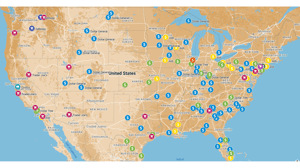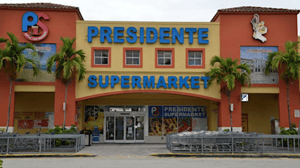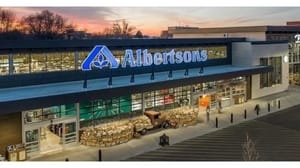HONORING DEBITS
Debit cards have become the darling of retailers -- the preferred type of customer payment for groceries over checks, credit cards and even cash.Retailers, though, are calling on the financial community to better educate consumers about card usage and raise confidence in the payment option. They told SN they want to see more debit card action for three key reasons:Lower fees. Processing fees for debit
November 18, 1996
DON YAEGER
Debit cards have become the darling of retailers -- the preferred type of customer payment for groceries over checks, credit cards and even cash.
Retailers, though, are calling on the financial community to better educate consumers about card usage and raise confidence in the payment option. They told SN they want to see more debit card action for three key reasons:
Lower fees. Processing fees for debit card payments, charged on a per transaction basis, are lower than that for credit cards, where fees are charged as a percentage of sale.
Productivity gains. Checkout time is faster as obtaining debit account approval can take as little as four seconds, according to one retailer.
Reduced front-end losses. Reduced cash handling and less money in the till leads to fewer incidences of theft.
"Debit cards are a swift, safe way to conduct a transaction," said Jack Brown, chief executive officer of Stater Bros. Markets, Colton, Calif.
The chain, which has accepted debit and credit payments for only 18 months, already does 20% of its business in plastic. Credit cards clearly represent the bulk, 80% of card usage, while debit cards account for the remainder.
Brown said he absolutely would like to see debit card usage increase. "When people understand how to use them, they will become very common," he said, echoing shopper acceptance concerns expressed by other retailers.
Paul Nicholson, vice president of finance, Pay Less Supermarkets, Anderson, Ind., agrees that debit usage will increase when consumer confusion is eased. He pointed out that many banks in Indiana have changed names in the past two years, and that factor, combined with changing banking laws, have compounded consumer uncertainty.
"Most customers will not use a debit card if they fear it will be declined at checkout and they will be embarrassed," Nicholson said. "The bank network must do the lion's share of educating consumers as to what its card is. In our ads, we can't list all of the banks in a network." In most of Indiana, there are now three major bank networks in existence.
Nicholson said 3% of sales are debit transactions at Pay Less while 12% of sales are credit cards purchases.
"Banks have not done a good job in educating people about debit cards," said Barbara Ramsour, information systems director for Balls Food Stores, a 20-unit chain in Kansas City, Kan.
She also said shoppers resent paying a $1 debit transaction fee to some banks which offer checking accounts for free, she noted.
Debit transactions make up 2% of sales at Balls and credit cards comprise 9.5% of sales. During August, the company recorded more than 93,000 credit card transactions vs. more than 20,000 debit transactions.
"We would love to have more debit," Ramsour said. It was noted that debit, with an approval time of only four to five seconds is quicker than handling cash and checks.
"We will try all we can to promote debit cards -- if the banks work with us," she said. Many retailers pointed out that banks have been slow to promote debit card programs.
Pay Less is among those retailers which has gained banks' support to launch an aggressive program to promote debit cards.
The chain partnered with one banking institution to distribute store-prepared fliers with mailed bank statements telling bank customers that they could use that bank's card at Pay Less. The other promotion, also inserted with mailed statements, listed the names of a number of retailers accepting that bank's debit card.
Stater Bros. also takes a hand in actively pushing debit usage. The firm's weekly circular contains a half-page ad devoted to its "Stater Express" electronic payments program.
Consumer education of debit as a payment option will be enhanced further when counties in the market area begin accepting electronic benefits transfer transactions. "People presently not using debit will see how easy it is to use," said Brown of Stater Bros.
Inroads into EBT also will push debit business at Schnuck Markets, St. Louis, said Todd Schnuck, chief financial officer. He anticipates that debit card usage will increase significantly this year as pilot testing of EBT is rolled out.
Debit and credit cards at Schnuck currently have nearly identical usage rates of 5% to 6% of customer sales. The company, which has offered the debit card option for about six years, wants to encourage usage, but has no specific marketing or informational program for that purpose.
Some retailers report a correlation between the number of years they've been offering the debit option and the volume of debit card sales.
Dahl's Food Markets, Des Moines, Iowa, an early adopter of debit in 1982, now attributes 16% of its sales to those cards, said Frank Tamse, manager of accounting. The cards were accepted in 11 of the firm's 13 stores by 1986.
In Iowa, a network of banking institutions under the Iowa Transfer System makes it easy to use debit cards, another Dahl's spokesman said.
Wisconsin has had a mature debit network since the 1970s, said Ken Clausing, director of retail services for Roundy's, Pewaukee, Wis. As a result, the company's retailers in Milwaukee do as much as 12% of their total sales on debit cards.
Retailers representing 70% to 80% of Roundy's volume now offer a debit/credit card payment option, he said.
"They know that they have to have them as a competitive tool," Clausing pointed out. "Small or large, it's almost automatic for retailers to accept debit and credit cards now. Of course the biggest advantage of debit is in the fee they pay."
Debit has grown in the past three years, he noted, and will continue to grow despite few efforts to promote it actively.
At corporate stores and affiliated retailers of Fleming Cos., Oklahoma City, debit card usage has shown dramatic growth in the past two years, said Richard Palmer, corporate manager of electronic payments. As more banks issue cards and as consumer confidence grows, debit card transactions this year are running 44% ahead of last year, he noted.
Palmer said that debit action finally is increasing in the Midwest after having been confined largely to the East and West Coasts in the past. "As people get transferred to the Midwest, they bring the trends with them."
Debit usage will continue to grow as customers come from a new generation attuned to plastic, according to Palmer. "With debit cards, they don't have to purchase checks and they don't have to carry cash."
A sponsor bank's payment to the retailer of as much as 2 cents per debit transaction has aroused interest at Brodbeck Enterprises, Platteville, Wis., which operates eight Dick's Supermarkets.
"We now need to begin taking a look at how we can get the customer to use that card," said Bob Brodbeck, a consultant who previously was president and chief executive officer for the company.
"If we can make a couple of cents on a debit purchase, we definitely need to focus on it. Bank costs involving checks and cash continue to increase." Presently, only 1% of transactions at Dick's are made with debit cards.
Dick's and other retailers note that debit usage often is dependent on demographic factors. For example, the firm's lowest usage rates of debit cards are at a store in a tourist area.
In Des Moines, where Dahl's stores run from 9% to 20% in debit, the lowest usage units are in working class and retiree neighborhoods, where residents still prefer to do business with cash.
Mike Williams, manager of electronic funds transfer at Associated Grocers, Seattle, said debit transactions are important to the retailers the wholesaler services. Associated Grocers is now evaluating an advertising campaign similar to one launched two years ago that rocketed debit transaction volume dramatically.
A regional ATM/POS network in the Puget Sound area raised consumer awareness through print, radio and television in 1994, and that "helped us tremendously," Williams said. "Our debit card transaction volume jumped 50%"
Retailer participation in the debit program has soared in the past three years, Williams said, as retailers join for competitive reasons. At the end of 1992, 110 of Associated's more than 300 members were on a debit program. Now the number is 203. About 60% of transactions handled by the firm's switching network are debit and the remainder credit, it was noted.
About the Author
You May Also Like




